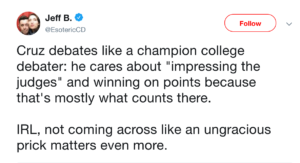One of the most fascinating things, to me, about the current moment and the revival of socialism is how the whole question of democracy—not substantive or deep democracy, not participatory democracy, not economic democracy, but good old-fashioned liberal democratic proceduralism—plays out right now on the left.
Throughout most of my life and before, if you raised the banner of socialism in this country or elsewhere, you had to confront the question of Stalinism, Soviet-style sham elections, one-party rule, and serial violations of any notion of democratic proceduralism. No matter how earnest or fervent your avowals of democratic socialism, the word “democracy” put you on the defensive.
What strikes me about the current moment is how willing and able the new generation of democratic socialists are to go on the offensive about democracy, not to shy away from it but to confront it head on. And again, not simply by redefining democracy to mean “economic democracy,” though that is definitely a major—the major—part of the democratic socialist argument which cannot be abandoned, but also by taking the liberal definition of democracy on its own terms.
The reason this generation of democratic socialists are willing and able to do that is not simply that, for some of them, the Soviet Union was gone before they were born. Nor is it simply that this generation of democratic socialists are themselves absolutely fastidious in their commitment to democratic proceduralism: I mean, seriously, these people debate and vote on everything! It’s also because of the massive collapse of democratic, well, norms, here at home.
First, you have the full-on assault on voting rights from the Republican Party. Then there’s the fact that both the current and the last Republican president were only able to win their elections with the help of the two most anti-democratic institutions of the American state: the Electoral College and the Supreme Court. In both cases, these men won their elections over candidates who received more popular votes than they did. There’s a lot of words one might use to describe a system in which the person who gets fewer votes wins, but democracy isn’t one of the ones that comes immediately to mind. Any notion that anyone from that side of the aisle is in any position to even speak on the question of democratic values—again, not robust democratic values but minimal democratic values—is a joke.
Second, you have the Democratic Party. Massively dependent in its nomination process on super-delegates. Massively dependent in its district-level wins on low voter turnout, in districts where the party structure resembles the Jim Crow South, as described by V.O. Key. You have incumbents like Joe Crowley who’ve not had to face a primary challenge in so long that, as we saw in the case of Alexandria Ocasio-Cortez, they don’t even know how to wage much less win electoral campaigns. You now have, in the case of Julia Salazar’s race for the New York State Senate (whose campaign I really encourage you to donate to), an incumbent, Martin Dilan, who’s trying to forgo an election challenge from her simply by forcing Salazar off the ballot, with the help of, you guessed it, the least democratic branch of the government: the courts. I can imagine the Democratic Socialists of America (DSA) folks saying to these Dems: you really want to have a debate with us about democracy? Bring it on.
And last you have this very sophisticated take by Seth Ackerman, who has become in a way the intellectual guru behind the whole DSA strategy, on how the party system in America works. Right around the 2016 election, Seth wrote a widely read (and cited) piece, which has become something of a Bible among the DSA set, on how to think about a left party that can avoid some of the pitfalls of third-party strategies in the US.
Here, in this interview with Daniel Denvir, the Terry Gross of the socialist left, Seth explains how much our two-party system looks like those one-party states that socialists of the 20th century spent their lives either defending or being forced to criticize in order to demonstrate their bona fides.
Again, what I think this shows is that, maybe for the first time in a very long time, socialists have the democracy side of the argument on their side.
Here’s Seth:
In most places in the world, a political party is a private, voluntary organization that has a membership, and, in theory at least, the members are the sovereign body of the party who can decide what the party’s program is, what its ideology is, what its platform is, and who its leaders and candidates are. They can do all of that on the grounds of basic freedom of association, in the same way that the members of the NAACP or the American Legion have the right to do what they want with their organization.
In the United States, that’s not the case at all with the Democratic Party or the Republican Party. We’ve had an unusual development of our political system where, in the late nineteenth and early twentieth centuries, the bosses of the two major parties undertook a wave of reforms to the electoral system that essentially turned the political parties into arms of the government, in a way that would be quite shocking — you could even say “norm-eroding” — in other countries.
If you took a comparative politics class in college during the Cold War, it would have discussed the nature of the Communist system, which was distinguished from a democratic system by the merger of the Party and the state, becoming a party-state. Well, the United States is also a party-state, except instead of being a single-party state, it’s a two-party state. That is just as much of a departure from the norm in the world as a one-party state.
In the United States, the law basically requires the Democrats and the Republicans to set up their internal structures the way that the government instructs them to. The government lays out the requirements of how they select their leaders and runs their internal nominee elections, and a host of other considerations. All this stuff is organized by state governments according to their own rules. And of course when we say state governments, who we’re talking about the Democrats and the Republicans.
So it’s a kind of a cartel arrangement in which the two parties have set up a situation that is intended to prevent the emergence of the kind of institution that in the rest of the world is considered a political party: a membership-run organization that has a presence outside of the political system, outside of the government, and can force its way into the government on the basis of some program that those citizens and members assemble around.






